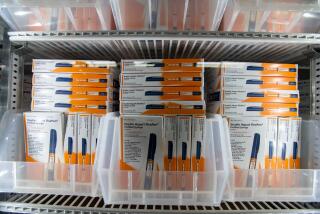FDA to Seek More Power to Punish Drug Companies for Bribery, Fraud
- Share via
WASHINGTON — The Food and Drug Administration, grappling to contain a burgeoning scandal within its generic drugs division, announced Friday that it will ask Congress for increased authority to punish drug manufacturers that commit bribery, falsify data or engage in other improper activities to gain speedy drug approval.
The agency said also that it planned to intensify its surveillance of generic drug manufacturers and broaden its current investigation of generic companies to include inspecting laboratories that perform pre-market testing under contract to the generic companies.
“I emphasize that we have no evidence that the safety or effectiveness of generic drugs has been compromised,” Health and Human Services Secretary Louis W. Sullivan said in a written statement. “Nevertheless, the Food and Drug Administration has launched extensive reviews of generic drug firms and products, and will continue until we can fully confirm the overall quality and safety of generic drugs.”
Low-Priced Copies
The action was taken amid a widening federal investigation of the generic drug industry, which produces almost one-third of the prescription drugs made in the United States. Generic drugs are low-priced copies of brand-name prescription drugs whose patents have expired. The industry was reported to have sales totaling $3.4 billion last year.
The probe has yielded disclosures that several companies have bribed FDA officials to obtain faster approval for their products and that others have fraudulently submitted drug samples to the government for examination.
The department did not specify the procedures it would seek from lawmakers. But HHS and congressional sources said that among the proposals under consideration was the power to deny companies all future federal approval of their drugs if their employees are found to have offered bribes or commited other offenses.
The same sources said the FDA was also considering requesting authority to impose substantial civil monetary penalties on companies that submit applications found to be fraudulent. Further, these sources said, the agency would seek to suspend or withdraw an already approved drug from the market if a company was found to have been “tainted by improper activities” in getting that drug approved.
Lack of Power Cited
FDA officials have said that they have no power now to stop the marketing of drugs in such instances.
FDA officials said the agency would create a new office of generic drugs, with new management and additional resources, and would establish an independent ombudsman directly under the FDA commissioner who would mediate grievances from the generic companies.
On Wednesday, the FDA announced that it would seize samples of the 30 top-selling generic drugs and examine them to be sure their formulations matched those that received federal approval.
“If unsafe or ineffective drugs are discovered, FDA will move rapidly to have them removed from commercial distribution,” Sullivan said. “If a company is found to have submitted false data, FDA will seek to remove all drug products that have been implicated.
“And, if evidence points to widespread manufacturing deficiencies, FDA will move to block the marketing of all drugs produced in the manufacturing facility until the deficiencies have been fully corrected.”
Two Investigations
The generics industry has been under investigation by the U.S. attorney in Baltimore and the House Energy and Commerce oversight subcommittee.
Three FDA chemists in the agency’s generics division pleaded guilty to accepting illegal gifts from firms producing generics, and they have since left the agency.
There are about 350 companies nationwide that produce generics, but the vast majority of generic drugs are produced by several dozen of those firms.
“Everyone in FDA, including myself, is deeply dismayed and outraged, as I am sure consumers are, by the highly unethical conduct displayed by a small number of generic drug companies, and by three agency employees who have now resigned,” FDA Commissioner Frank E. Young said in a written statement. “Their corrupt behavior has jeopardized the public trust and called into question the integrity of the system.”
Initiatives Welcomed
Rep. John D. Dingell (D-Mich.), chairman of the House Energy and Commerce Committee and chairman of its oversight subcommittee, welcomed the FDA’s latest initiatives.
“When the promised legislative proposals are developed,” Dingell said, “they will receive appropriate consideration. But, before we can be confident of any comprehensive solution, we will need to have a fuller understanding of the dimensions of the problem.”
To that end, he said, the subcommittee will continue to pursue its investigation.
More to Read
Sign up for Essential California
The most important California stories and recommendations in your inbox every morning.
You may occasionally receive promotional content from the Los Angeles Times.









